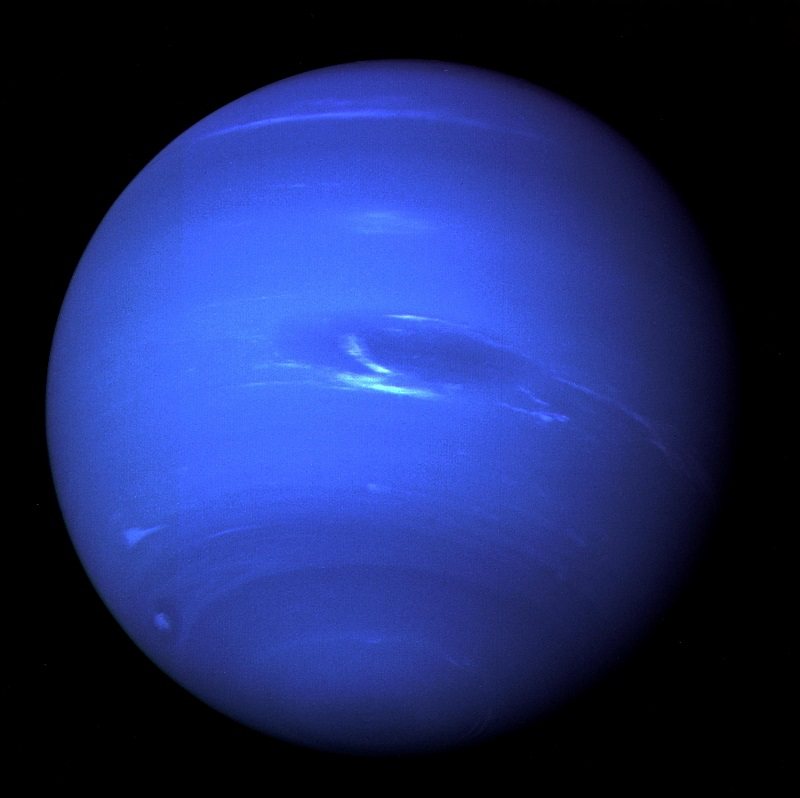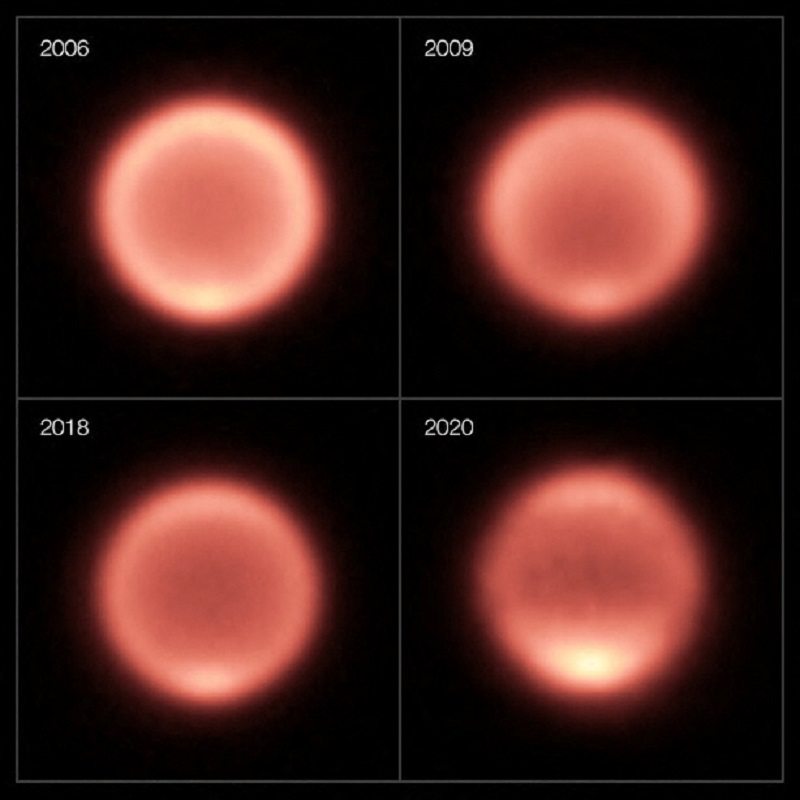
The “Great Dark Spot,” a storm in the atmosphere and the bright, light-blue smudge of clouds that accompanies the storm is seen on Neptune, photographed by the NASA spacecraft Voyager 2 less than five days before its closest approach of the planet on Aug. 25, 1989.
7:00 JST, April 27, 2022
WASHINGTON (Reuters) — Frigid and far-flung Neptune, our solar system’s outermost planet, is adding to its reputation as an enigmatic world, with astronomers puzzled by a surprising drop in its atmospheric temperatures during the past two decades.
Focusing upon Neptune’s stratosphere — the atmosphere’s relatively stable region above the turbulent weather layer — the researchers had expected to find rising temperatures in the part of the planet visible from Earth with the onset of its southern hemisphere summer, a season lasting four decades. Instead, they found temperatures declining significantly.
The study was based on more than 95 thermal-infrared images — every one ever taken — spanning 2003 to 2020 using ground-based telescopes in Hawaii and Chile, mostly the European Southern Observatory’s Very Large Telescope. It is the most comprehensive assessment to date of Neptune’s atmospheric temperatures.

This composite shows thermal images of Neptune taken between 2006 and 2020. After the planet’s gradual cooling during the period covered by the thermal images, the south pole appears to have become dramatically warmer in the past few years, as shown by a bright spot at the bottom of Neptune in the images from 2018 and 2020.
“The atmosphere appears more complicated than we had naively assumed, which, unsurprisingly, seems to be a general lesson that nature teaches scientists again and again,” said Michael Roman, a postdoctoral researcher at the University of Leicester in England and lead author of the study published on April 11 in the Planetary Science Journal.
Neptune’s stratosphere temperature fell as much as 8 C to minus 117 C over the 17 years studied. In contrast, temperatures in Neptune’s troposphere — the even-colder weather layer — showed no significant variability while reaching as low as minus 223 C.
Neptune is among the least explored of the solar system’s eight planets, with its great distance making it difficult to study from Earth. NASA’s Voyager 2 is the only spacecraft to have made a close-up visit, flying past Neptune in 1989.
“I think Neptune is very intriguing to many of us because we still know so little about it,” Roman said.
Its temperature changes were unevenly distributed, with regional variations. The southern tropics cooled, then warmed, then cooled again. Mid-latitudes temperatures initially remained constant before falling gradually. South pole temperatures initially dropped only slightly before warming dramatically between 2018 and 2020.
“I suspect the overall temperature drop may most likely be due to changes in the atmospheric chemistry, which responds to changing seasonal sunlight and, in turn, alters how effectively the atmosphere cools,” Roman said.
Neptune’s average diameter is about 49,250 kilometers, making it four times wider than Earth. It orbits more than 30 times as far away from the sun as Earth at an average distance of about 4.5 billion kilometers, needing about 165 Earth years to complete a single orbit around the sun — a Neptunian year.
The dwarf planet Pluto most of the time orbits even further away but its oval-shaped orbit sometimes brings it closer to the sun than Neptune.
Neptune and neighboring Uranus are classified as ice giants, as opposed to the gas giants Jupiter and Saturn. Neptune, which like those other planets lacks a solid surface, possesses an extremely dynamic atmosphere mainly of hydrogen and helium, with a small amount of methane, atop a mantle mostly of slushy ammonia and water and a solid core. Neptune boasts the strongest winds of any planet.
Neptune may offer lessons about planets beyond our solar system, called exoplanets, said study coauthor Glenn Orton, a planetary scientist at Caltech’s Jet Propulsion Laboratory.
“The close relationship that Neptune may share with a large segment of the population of exoplanets,” Orton said, “means that it may be ‘an exoplanet in our backyard’ — probably on the colder end of that spectrum, but still a model for the things we might expect to see in the meteorology of various exoplanets.”
Top Articles in News Services
-

Survey Shows False Election Info Perceived as True
-

Hong Kong Ex-Publisher Jimmy Lai’s Sentence Raises International Outcry as China Defends It
-

Japan’s Nikkei Stock Average Falls as US-Iran Tensions Unsettle Investors (UPDATE 1)
-

Japan’s Nikkei Stock Average Touches 58,000 as Yen, Jgbs Rally on Election Fallout (UPDATE 1)
-

Japan’s Nikkei Stock Average Rises on Tech Rally and Takaichi’s Spending Hopes (UPDATE 1)
JN ACCESS RANKING
-

Producer Behind Pop Group XG Arrested for Cocaine Possession
-

Japan PM Takaichi’s Cabinet Resigns en Masse
-

Man Infected with Measles Reportedly Dined at Restaurant in Tokyo Station
-

Israeli Ambassador to Japan Speaks about Japan’s Role in the Reconstruction of Gaza
-

Videos Plagiarized, Reposted with False Subtitles Claiming ‘Ryukyu Belongs to China’; Anti-China False Information Also Posted in Japan
























